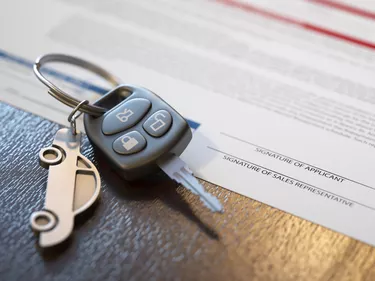
Taking out a car loan is a significant commitment that can greatly impact your financial health. It is critically important that you understand the loan document in its entirety, including all of its terms, as well as the maturity date for the car loan. Though the terms and acronyms included in the loan document can be confusing, they are vital for understanding your rights and responsibilities as a borrower – and for knowing when you own the car outright.
Maturity Date for Car Loans
Video of the Day
According to Canadian bank BDC, simply put, the maturity date is the date on which the borrower is scheduled to make their last payment to a car loan company. It should be spelled out in the loan's original terms; it should also explain how the loan's planned payments will satisfy the total amount of the loan.
Video of the Day
However, the maturity date in the loan agreement is not a guarantee. In other words, there are circumstances when the car may not have been paid off in full by the car loan company's end date.
When the Car Is not Paid by the Maturity Date
While the lender designed the loan to pay in full by the maturity date, if you missed payments or made incomplete payments at any time during the life of the loan, there could be an amount left over at the end.
Furthermore, you can be held fully responsible for those amounts immediately upon termination of the loan. The exception is if you and the lender agreed to defer, reduce or make other changes to your payments. As long as you make your payments on time and pay them in full, the loan's maturity date will likely be the date on which you will own your vehicle outright.
Lease Maturity Date
While the lease maturity date is somewhat similar to a loan maturity date, it's not quite the same. The most significant difference between the two is who has ownership and possession of the vehicle on the maturity date.
The lease maturity date is the date on which the terms of your lease end. This is typically the date on which you're expected to return the vehicle to the dealership or lender, unless you make other arrangements.
What Happens at the End of My Lease?
On the day you drove away with your vehicle, you probably signed a lease agreement. In that document, the dealership or lender spelled out the terms upon which the lease agreement ends, as well as many other terms and requirements. In most cases, all that you're obligated to do is return the vehicle (in decent or good condition) to the dealership.
You have two additional options, though. First, you can lease another vehicle right away from the same dealership. Dealerships are anxious to keep your business and getting you into another lease may be one of their top priorities. They may offer you incentives to lease another car from them. They may even forgive extra mileage or wear and tear on your old vehicle. You can also buy out your car at the end of the lease, thereby keeping it.
According to Edmunds, experts usually recommend against purchasing your leased vehicle, but there are circumstances in which it may make actually make more sense for you. Some such examples are if the car has depreciated substantially in value because of an accident, if you have a lot of additional mileage or if you really love this particular vehicle.